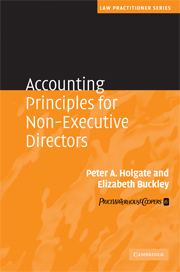Book contents
- Frontmatter
- Contents
- Acknowledgements
- Which standards and legislation has this book been based on?
- Glossary of terms
- Part I The accounting environment
- Part II Some specifics
- 8 Individual entity and consolidated financial statements
- 9 Presentation of financial statements
- 10 Earnings per share
- 11 Mergers and acquisitions
- 12 Interaction of accounting with tax
- 13 Assets
- 14 Liabilities
- 15 Leases
- 16 Pensions
- 17 Financial instruments
- 18 Share-based payment
- 19 Realised and distributable profits
- 20 Disclosures in published annual reports
- Appendices
- Index
13 - Assets
from Part II - Some specifics
Published online by Cambridge University Press: 02 November 2009
- Frontmatter
- Contents
- Acknowledgements
- Which standards and legislation has this book been based on?
- Glossary of terms
- Part I The accounting environment
- Part II Some specifics
- 8 Individual entity and consolidated financial statements
- 9 Presentation of financial statements
- 10 Earnings per share
- 11 Mergers and acquisitions
- 12 Interaction of accounting with tax
- 13 Assets
- 14 Liabilities
- 15 Leases
- 16 Pensions
- 17 Financial instruments
- 18 Share-based payment
- 19 Realised and distributable profits
- 20 Disclosures in published annual reports
- Appendices
- Index
Summary
Introduction
The key questions that arise in relation to assets are: what is the definition of an asset; which assets are recognised on balance sheet; when are they first recognised; how are the assets that are recognised on balance sheet measured; and whether the assets should be written down for impairment. There are also questions of how assets should be classified and presented on balance sheets, and questions of depreciation. These issues are considered in turn.
Definition of an asset
In a formal sense, the IASB's Framework for the Preparation and Presentation of Financial Statements defines an asset as ‘a resource controlled by the entity as a result of past events and from which future economic benefits are expected to flow to the entity’. The Framework explains that:
‘The future economic benefit embodied in an asset is the potential to contribute, directly or indirectly, to the flow of cash and cash equivalents to the entity. The potential may be a productive one that is part of the operating activities of the entity. It may also take the form of convertibility into cash or cash equivalents or a capability to reduce cash outflows, such as when an alternative manufacturing process lowers the costs of production’.
Less formally, an asset is something of value that a company controls.
Recognition of assets
From the definition, it might appear that all a company's assets are recognised on the balance sheet. In fact, they are recognised only if they meet the recognition criteria: it is probable that the entity will get the economic benefits of the asset and that the asset can be measured reliably.
- Type
- Chapter
- Information
- Accounting Principles for Non-Executive Directors , pp. 124 - 129Publisher: Cambridge University PressPrint publication year: 2009



